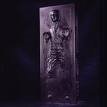
"The mask you wear before men will do you no good before Him. He wants to see you as you are, He wants to be gracious to you... He wants to love you."Does your congregation or church body allow secret ballots in its meetings, assemblies, or conventions?-Dietrich Bonhoeffer in Life Together
Do you think that this practice is biblical?
It deeply concerns me when brothers and sisters in Christ demand secret ballots, for I have never heard of a single good reason for the practice, and frankly, they seem completely counter to biblical Christianity and dangerous to the health of a congregation.
Let me explain.
The whole democratization of American Christianity puzzles me. Lutheran churches have adopted practices like voters' assemblies and congregational meetings, and the way such meetings are sometimes run, with secret ballots, seems to be clear evidence of, and I hate to use this term, a dysfunctional church.
 The fact that Christians are sometimes unwilling to publicly say what they think and submit it to God's Word for brotherly discussion, evaluation, and if necessary, correction, -- this is counter to the Christian faith and fellowship and is a very dangerous practice in the life of a congregation.
The fact that Christians are sometimes unwilling to publicly say what they think and submit it to God's Word for brotherly discussion, evaluation, and if necessary, correction, -- this is counter to the Christian faith and fellowship and is a very dangerous practice in the life of a congregation.Here are some initial reasons for this assertion:
1. Perhaps those who want secret ballots are afraid of being mistreated or ridiculed for having certain opinions. In this case, those with differing views might need to change or even repent. Even if we are right, we are called to correct our brothers and sisters "in a spirit of gentleness; each one looking to yourself, so that you too will not be tempted. Bear one another's burdens, and thereby fulfill the law of Christ." (Galatians 6:1-5, NASB)
Secrecy can foster an 'Us vs. Them' mentality among brothers and sisters in Christ and allow both fear and suspicion to undermine genuine fellowship. Secret ballots allow Christians to continue in fear and suspicion of each other.2. Perhaps Christians want secret ballots because they cannot explain their opinions in the light of God's Word and are therefore, at best, basing their votes upon subjective feelings. Or graver still, maybe they know that what they are voting for is not in accord with God's Word. Such situations are, of course, not good for the congregation or the voters themselves, for such voters who wish to affect the life of a congregation behind the curtain of secrecy are merely being "tossed about by every wind of doctrine" and their unbiblical voices are affecting the life of the congregation without the possibility of correction that openness provides. This is very dangerous situation, for decisions about Christ's Church are made out of emotion or sin, rather than out faith in God and His Word. (Ephesians 4:14-16, NASB)
3. Perhaps those who want their votes to be secret just don't like the pastor because he faithfully preaches and teaches God's Word in undiluted Law and Gospel. If this is the case, then I would even say that such opposition to the Office of Holy Ministry is demonic in nature and needs to be brought to the Light and then seriously and tenaciously opposed by God's people. Such voters need to be brought to repentance, and the use of secret ballots in this case is endangering their souls.
4. Perhaps there is some hidden, unbiblical agenda, coordinated in political conventicles. It is no secret that people bring the political ways of this world into Christ's Church, and this is also a dangerous situation that must be rooted out by God's people, for Jesus said, "I am the Light of the world; he who follows Me will not walk in the darkness, but will have the Light of life!" (John 8:12, NASB)
 Every public matter in the life of a church should be brought forth and dealt with openly under the Light of God's Word. Satan is, as Samwise Gamgee called Gollum in The Lord of the Rings, a slinker, and as we learned from Screwtape, the Father of Lies thrives upon secrecy. Therefore, it is of utmost importance that members of a congregation stand together under Holy Scripture and its faithful exposition in the Office of Holy Ministry. We must expose the slinker for what he is, even as he attempts to work his mischief through secrecy in the midst of a congregation.
Every public matter in the life of a church should be brought forth and dealt with openly under the Light of God's Word. Satan is, as Samwise Gamgee called Gollum in The Lord of the Rings, a slinker, and as we learned from Screwtape, the Father of Lies thrives upon secrecy. Therefore, it is of utmost importance that members of a congregation stand together under Holy Scripture and its faithful exposition in the Office of Holy Ministry. We must expose the slinker for what he is, even as he attempts to work his mischief through secrecy in the midst of a congregation.The Father of Lies wants to hold God's people in the bondage of false belief. We know that this is certainly true, so out of Christian love and concern for those who wish secret ballots, we must reject such secrecy and ask for a biblical openness. But Christians should not seek such openness for political purposes, but rather, out of a desire for true Christian fellowship. The Gospel of Christ calls believers to openness and honesty in our relationships with God and with each other, so that we might enjoy peace and true fellowship of the Spirit through God's Word.
Christians are called to walk in the light, and because of the grace of God in Jesus Christ, we can, indeed, take off our masks and bring everything out into the light where it can be approved, corrected, healed, or forgiven.
 In his Small Catechism, Martin Luther explains that in the sixth petition of the Lord's Prayer, we are instructed to pray "that God would guard and keep us, so that the devil, the world, and our flesh may not deceive us, nor seduce us into misbelief, despair, and other great shame and vice." Misbelief or false belief is, indeed, a grave sin to which we are constantly tempted; and it is a sin of which we must repent. Tragically, however, secret ballots help us keep this sin hidden, where correction cannot take place through biblical catehesis or where the healing power of Christ's blood cannot be applied through Holy Absolution. And as Dietrich Bonhoeffer so astutely observed in Life Together, "He who is alone with his sin is utterly alone." Therefore, Christian charity for our brothers and sisters demands that we reject the continued practice of secrecy.
In his Small Catechism, Martin Luther explains that in the sixth petition of the Lord's Prayer, we are instructed to pray "that God would guard and keep us, so that the devil, the world, and our flesh may not deceive us, nor seduce us into misbelief, despair, and other great shame and vice." Misbelief or false belief is, indeed, a grave sin to which we are constantly tempted; and it is a sin of which we must repent. Tragically, however, secret ballots help us keep this sin hidden, where correction cannot take place through biblical catehesis or where the healing power of Christ's blood cannot be applied through Holy Absolution. And as Dietrich Bonhoeffer so astutely observed in Life Together, "He who is alone with his sin is utterly alone." Therefore, Christian charity for our brothers and sisters demands that we reject the continued practice of secrecy.  Indeed, secret ballots seem to fly in the face of both the nature of Christ (especially in the Gospel of John with its emphasis on light and darkness) and the biblical doctrine of Christian fellowship, through which we are called to 'walk in the Light'. Secret ballots can be used as masks that enable us to avoid the Light of our Lord, so that we do not have to explain our decisions, enter into fruitful dialogue with our brothers and sisters in Christ, or submit ourselves to the Light of God's Word and the Office of Holy Ministry. Secret ballots are one disturbing symptom of sickness in the life of a congregation, one tactic of the enemy's gorilla warfare of darkness against the Light of God's Word.
Indeed, secret ballots seem to fly in the face of both the nature of Christ (especially in the Gospel of John with its emphasis on light and darkness) and the biblical doctrine of Christian fellowship, through which we are called to 'walk in the Light'. Secret ballots can be used as masks that enable us to avoid the Light of our Lord, so that we do not have to explain our decisions, enter into fruitful dialogue with our brothers and sisters in Christ, or submit ourselves to the Light of God's Word and the Office of Holy Ministry. Secret ballots are one disturbing symptom of sickness in the life of a congregation, one tactic of the enemy's gorilla warfare of darkness against the Light of God's Word.Today the 63rd Convention of my church body, the Lutheran Church-Missouri Synod, commences at the George R. Brown Convention Center in Houston, Texas. The word synod means 'walking together', but how can we join arms in our journey together if we hide them behind our backs in fear and suspicion? Or how can we possibly obey God's command:
Therefore I, the prisoner of the Lord, implore you to walk in a manner worthy of the calling with which you have been called, with all humility and gentleness, with patience, showing tolerance for one another in love, being diligent to preserve the unity of the Spirit in the bond of peace. (Ephesians 4:1-3, NASB)How is Christian fellowship in the 'unity of the Spirit' under God's Word even possible when we have moved from an open, biblical "Here we stand" approach to witness and fellowship, to a political, individualist "Here I... it's none of your business!"
In conclusion, I would suggest that the continued worldly secrecy in relations between brothers and sisters in Christ is clear evidence that our churches have imbibed political ways of relating to each other that are based upon ungodly concepts of power and individualism, rather than upon a biblical understanding of Christian fellowship that teaches us to bear one another's burdens and speak the truth of God's Word to each other in love.
This widespread infection of political and individualist thinking needs to be marked and rejected by pastors, boards of elders, and church councils for the sake of Christ and His Church. We must not be "conformed to this world, but be transformed by the renewing of our minds, so that we would may prove what the will of God is, that which is good and acceptable and perfect." (Romans 12:2).
Pax Christi.










8 comments:
Well said, Rob. I agree. Unfortunately, it was decided (I believe at the December 13, 1998 voters meeting) to modify the by-laws of our congregation that congregational officers be "elected by ballot." By Robert's Rules, a ballot can be used at any time for any meeting, but only if a vote is taken to do so. As you know, it has been suggested by some in our congregation that ALL votes be taken by ballot. I don't know if this the trend in our synod, but I agree with you that this destroys the unity of the spirit. In addition, it shows that there is already a lack of trust among members when such attitudes are adopted.
That said, I can imagine that there are times when possibly a ballot may actually help to maintain unity because an issue is just too contentious and voting by hand at a certain point may cause the formation of factions. I think the question needs to be asked when a secret ballot is requested: what is the purpose in this instance?
Hmm. I wonder what answers we would get to that question of what the purpose of secrecy is. But regarding this post, I was thinking more broadly than that of our particular congregation.
I certainly applied concerns of this post to churches in general, and if any reader has other thoughts or experiences in their congregation worthy of mention, I would certainly would appreciate a comment. I can think of other situations in which the "bring everything out under the Light of Scripture" would apply.
Putting the best construction on others, I would hope that my honest concerns would be considered, if they are indeed valid. I would also certainly hope that folks would want to have a conversation about the things that I pointed out here.
Pax.
I'm not sure how this relates exactly to the OHM, but unions recently failed an attempt to allow people to unionize via public ballot, leaving it to secret ballot. Non-union people who would vote against unionization stood to be harassed if pro-union people knew their vote. I would hope this situation would not arise in a Christian voters' meeting, but there probably is a very small place for secret ballots.
Perhaps catechesis is needed due to the fact that many people simply assume that the way things are done in union meetings or in the business world is the way that they should do things in the church.
But how very sad, indeed, if fear and a harassment, like that found in nasty labor unions, would also occur in the house of God. But I am sure that there might be dear brothers and sisters in my parish who are afraid of me due to my frailty and sin. I am often loud and opinionated and tend to quote Scripture. The tone of the way I say things might sound scary, and perhaps they think I would go for their jugular vein, if they disagreed with me.
Perhaps 'Step #1' in a catechetical effort that might lead a congregation in a more biblical, healthy direction would be the acknowledgment by the congregation that the need for secret ballots among brothers and sisters in Christ is a symptom of a problem, and then, perhaps, they could start by talking about why they do not trust each other. But, alas, this would require openness as well. Masks would have to come off.
Maybe I am just dreaming.
When I was a congregational president, we did not use secret ballots. I knew that if the vote was not public, people from either side would feel it was rigged.
Yet I would very much have liked to spare the innocent being abused by the, well, I'll say political, when their votes didn't please them.
I'm glad I've seen several of my concerns addressed in the other comments. It makes me like the original post much better. I agreed with most of it, but could imagine exceptions. Apparently so can the author.
My questioning the practice of secret ballots has had me thinking about how Christians interact with each other or fail to interact with each other due to our frailty and sin. Secret ballots seem like a small, petty issue, but I am really considering what it means for a congregation to walk in the Light together. I am now even noticing what I am calling 'biblical openness' in Martin Chemnitz!
I am very glad that the comments to this post have clarified things, not only to this blog's readers but also in my own mind. Yes, I can now see the need for exceptions: Because of the hardness of the hearts of those whom Solar calls 'political' and also for the sake of the innocent who might suffer at their hands, we should sometimes permit secret ballots on a conditional basis; but from the beginning it has not been this way, to paraphrase Matthew 19:8. I continue to think that in so many of our relations with one another, we are hiding behind unbiblical fig leaves, and though due to our frailty they are sometimes necessary, we need to acknowledge that from the beginning it has not been this way.
Secret ballots should not be merely accepted as good, healthy, or normal, simply because they are used in the political systems of this world. God's people have the Ministry of the Keys in the Office of Holy Ministry, through which such problems in our relations with one another can and should be dealt with, as our pastors "correct, rebuke and encourage—with great patience and careful instruction" (2 Tim. 4:2). But if no one ever says that there is a problem, then the Emperor of Discord will continue to amble about in the buff, and churches will continue to be, to use that silly word again, dysfunctional.
With the unfortunate choice between 1) the innocent being abused by other parishoners versus 2) the continued problems of secrecy that I outlined in my original post, I certainly agree that sometimes secret ballots should be used conditionally. But I would also suggest that there are certainly times where God's people ought to suffer.
When there are serious marital problems that a husband and wife have just learned to 'live with', it might very well be God's will for them to openly talk about them, which more than likely will produce suffering: arguing, accusations, misunderstandings, tears, raised voices, etc. But we are not called to merely 'live with' problems; rather, we are called to love each other.
But such very unpleasant conversations, such openness, are sometimes the only way to reach a point of healthy fellowship. So now I am wondering if the continued uncritical use of secret ballots just keeps such needed-but-unpleasant conversations from occurring among God's people. Are we playing pretend? Like that married couple, perhaps we have learned to merely 'live with' our problems instead of, first, admitting they exist, and secondly, trusting God to bring about a solution.
I think that Solar and Dan's comments show us that even in God's house abuse and harassment can take place that, sadly and scandalously, necessitate the use of secret ballots. This is a very serious problem that should at least be identified. Would not the Apostle Paul call a spade a spade and tell a congregation that there is a problem in their midst?
Here is a condition that might be beneficial, if brothers and sisters feel the need for secret ballots: That whenever a vote takes place, God's people would openly acknowledge before God and each other that they are, indeed, choosing the lesser of two evils and that the need for continued secrecy with each other is a symptom of a very real problem. That we would ask God for His mercy and pray that this situation would change.
Would not this practice regularly highlight the need for our repentance, continued catechesis, conversations with each other, etc., all of which might not take place if secrecy continued to be accepted uncritically? If a congregation is not yet at a place of Christian fellowship where openness is possible, then at least the reasons why should be openly acknowledged by church leadership. Then the fact that there is a serious problem would at the very least be openly acknowledged and the ministry of the Word and Sacrament would, by God's grace, run its course in the life of the congregation. Hopefully, Christians would eventually no longer be fearful of the real or perceived danger of abuse or harassment from their brothers and sisters in Christ.
Hopefully, conversations could take place, and if there are false perceptions, then the fearful would begin to seem them as false and their fears as unwarranted. And maybe those who scare other Christians could learn how they might be threatening to their brothers and sisters, then perhaps they could be reconciled to those they scare. When the symptom of this problem is openly acknowledged, then even those Solar calls the 'political' might repent. If people felt threatened by me, I would want to know about it!
Bringing things into the open, or at least acknowledging the very sad reasons why we do not want to bring things out, seems biblical and healthy. I might be wrong, but I don't think so.
I won't modify the original post, because: 1) I still believe that its thesis is spot on, and 2) the helpful comments here have clarified my original position: There might, indeed, still be the need of conditional use of secret ballots in some very unfortunate congregational settings, but these sad situations ought to be openly and regularly acknowledged. Before each secret vote, perhaps the pastor might pray for God's mercy, asking our Lord for healing and greater Christian unity, that we might 'walk in the Light as He Himself is in the Light' so that we might 'have fellowship with one another' (1 Jn. 1:7).
Thanks for all for your thoughts! Blogging, at its best, is a conversation, a synthesis. I throw thoughts down and sound so dogmatic, but I am still thinking things through. I greatly value the helpful comments that folks contribute to this ungoing public conversation.
Pax Christi.
The problem of secret ballots is a product of women's suffrage. Men don't mind defending their votes and don't take things so personal when others disagree with them. There would be no call for secret ballots (or very rarely) if only men were allowed to vote.
Women's suffrage is unbiblical - women exerting authority over men by voting. This is our punishment for allowing such unbiblical practice to continue. It is a sign of judgment: "As for my people, children are their oppressors, and women rule over them." Isaiah 3:12
Ah, the irony of anonymous comments to a discussion of secret ballots... ;-)
But since it raises an interesting, although controversial question, I will let it stand.
Blessings.
Post a Comment